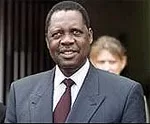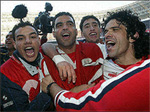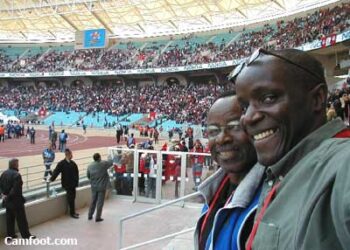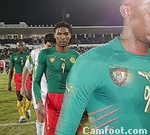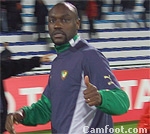TUNIS, 22 jan – Issa Hayatou has just won a fifth consecutive term at the helm of the CAF. It was not much of a fight to-day, as the Cameroonian got 46 votes out of 52. Ismail Bhamjee, the mild-mannered challenger from Botswana, did not stand a chance. This largely predicted landslide has not produced the kind of euphoric chest thumping you would have expected. Granted, the mood was by no means somber in either camp, but there was no over-rejoicing either. The President-elect looked grim and concerned. The CAF is at a crossroads.
From where I stand, it does not make a lot of sense to vote somebody in five times in a row. Such voting manners smack of banana republic traditions and are therefore alien to my taste. I believe that after a number of years in office, it is hard to change one’s ways, let alone implement any new challenging ideas. Hayatou, I am led to think, has done the best he could do.
The most visible accomplishment of Hayatou has to be the increased weight of Africa on the global football front. The adequate level of representation that the continent enjoys at the World Cup finals is no mean feat, and the support among non-African federations the President was able to muster for his bid to the top job at FIFA is testimony to his broad-based appeal. But the record of CAF on the nifty gritty field of football development at home in Africa does not look as stellar as the rise of its President on the world stage.
Why the folly, then, I asked a number of delegates, to vote him in again? Why is this man so important for African football?

A number of influential delegates from sub-Saharian Africa still consider CAF as the House that the Egyptians built. Hayatou’s first challenge would therefore be to somehow clean this house by freeing it from the Egyptian Football Federation’s influence and bringing it more closer to the other federations. I was told to expect heads to roll, privileges to be taken away, transparency and accountability to be heightened.
The establishment of football schools throughout the continent seems be a key concern of several delegates. They see these facilities as a means to combine formal education and football, and CAF is expected to play a central role in that regard.
I must have talked to about ten delegates last night and to-day, and I have to say that they do not sound overly concerned about the development of football as a recreational or amateurish pursuit for all. Rather, they have their eyes firmly glued to the prize: money, television rights, player transfer fees, professionalism.
It is a sign of the times, of course, and CAF must be involved. But I believe that the Confederation’s moral mission is to support the development of the game from the ground up. Spending all energies on elite football, i.e. marketable football, will not help it deliver on that mandate.
Let’s go to Sousse…
L. Ndogkoti , Tunis

